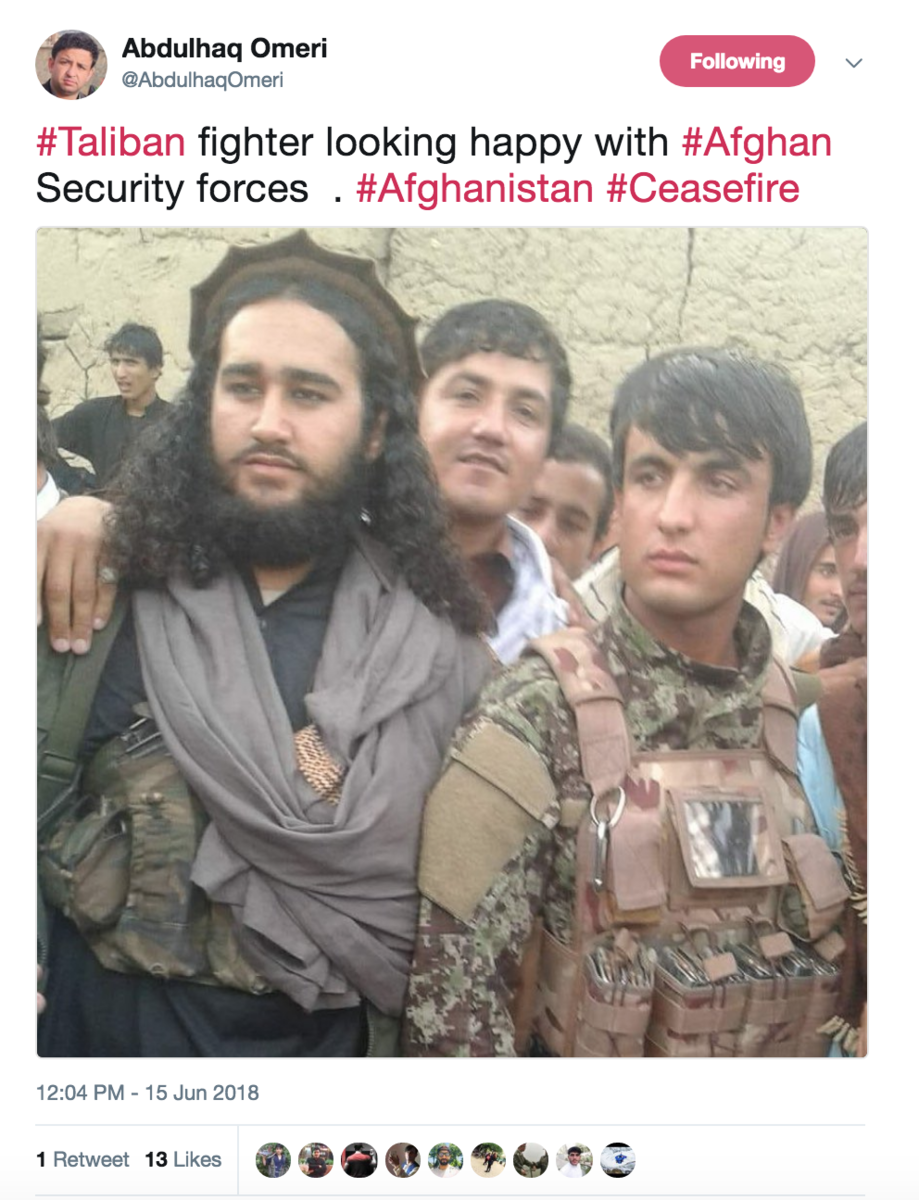BATI KOT, Afghanistan: Taliban fighters and Afghan security forces hugged and took selfies with each other in restive eastern Afghanistan on Saturday, as an unprecedented cease-fire in the war-torn country held for the second day of Eid.
Carrying assault weapons and rocket-propelled grenade launchers, members of Afghanistan’s biggest militant group traveled by car and motorbike through the contested district of Bati Kot in Nangarhar province, waving Afghan and Taliban flags.
Afghan forces manning checkpoints offered Eid greetings to the Taliban, embracing and posing for photos with the same people they are usually trying to kill – a scene that would have been unthinkable only a few days ago.
Villagers also flocked around the insurgents, hugging them and happily taking selfies with the heavily armed fighters as they celebrated the holiday capping the holy month of Ramadan.

(Photo courtesy: @AbdulhaqOmeri/Twitter)
“I am here to offer greetings to our brothers in the police and army,” Taliban commander Baba told AFP.
“We have held the cease-fire well so far. Everyone is tired of war and if our leaders order us to continue the cease-fire, we will hold it forever.”
A Taliban fighter on a motorbike carrying the Afghan and Taliban flags welcomed the cease-fire but said long-lasting peace would only be achieved if US forces left the country.
“We want an Islamic country and government. This cannot happen unless America leaves (Afghanistan),” he told AFP.
The Taliban announced a cease-fire for the first three days of Eid, which started Friday, promising not to attack Afghan security forces for the first time since the 2001 US invasion.
They said they would continue attacking US-led NATO troops.
That came after President Ashraf Ghani announced that police and troops would cease operations against the Taliban for eight days, starting last Tuesday – though he warned that operations against other militants, including the Daesh group, would continue.
Afghan Deputy Interior Minister Masood Azizi told AFP both sides had so far respected the cease-fire.
“Luckily it’s going well so far,” Azizi said.

(Photo courtesy: @AbdulhaqOmeri/Twitter)
Bati Kot is on the highway connecting the Nangarhar provincial capital of Jalalabad with Torkham, one of the major border crossings into Pakistan, which has long been accused of supporting the Taliban and providing safe haven to its leaders, charges it denies.
Afghans shared photos on social media purportedly showing Taliban fighters around the country gathering with security forces and locals for the holiday.
The bizarre images served as powerful propaganda for both sides and have fanned hopes among war-weary Afghans for the cease-fire to continue.
“Look, they are brothers. If their leaders come, sit and talk just like their soldiers we will have peace tomorrow,” Said Hasibullah posted on Facebook under a photo purportedly showing a Taliban fighter and Afghan soldier having a cup of tea together.
The Taliban had “exploited” the opportunity to show their popularity among ordinary Afghans, a Western diplomat in Kabul told AFP.
“(That’s) no bad thing if they are able to see the benefits of talking not fighting,” he said.


























